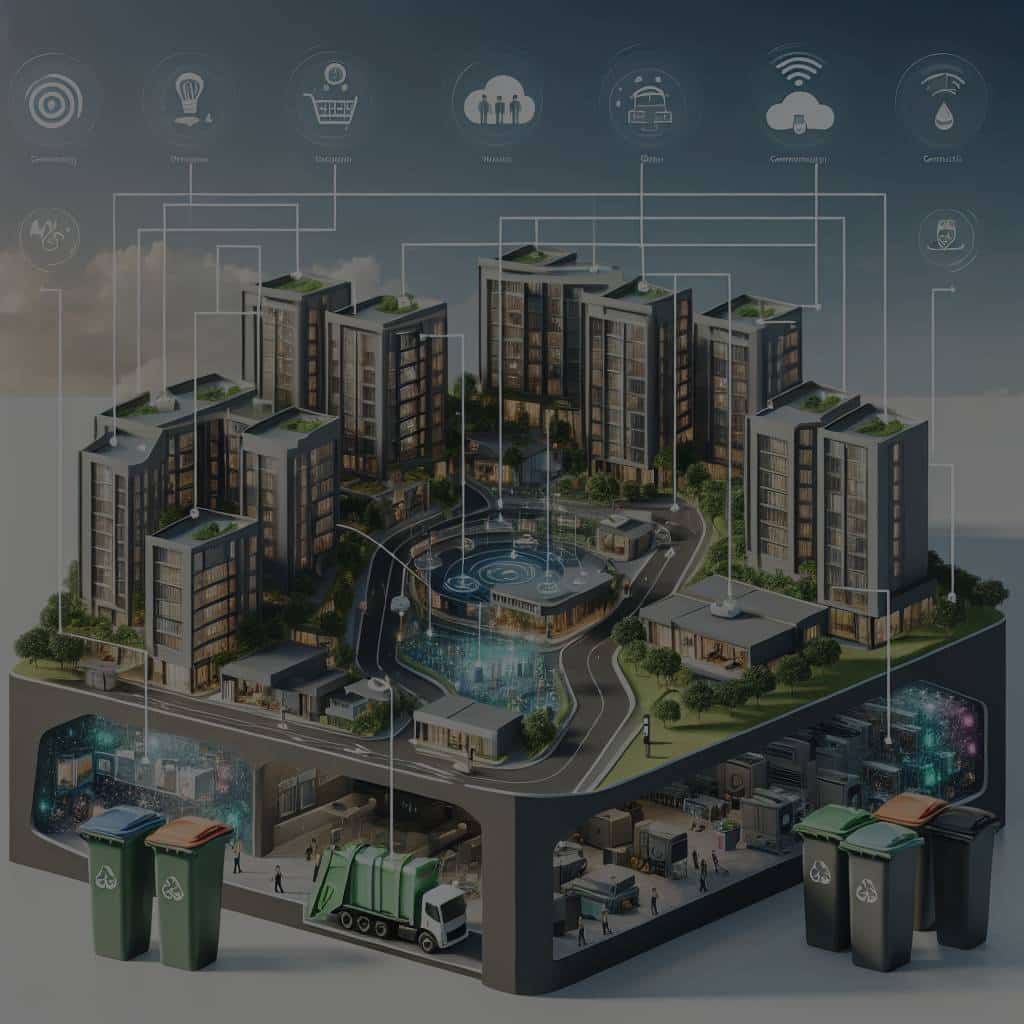Smart waste management has become a hot topic in today’s fast-paced and digital world. More than ever, cities are teeming with people, and waste generation is an inevitable part of city living. With the rising demand for sustainable and efficient waste management solutions, smart waste management systems have become the need of the hour. These systems leverage the power of data and the Internet of Things (IoT) to streamline waste collection and recycling processes. In this guide, we will walk you through how to implement such a system in a multi-unit real estate development, a common urban dwelling type.
Understanding Smart Waste Management
Before diving into the nuts and bolts of implementation, it’s essential to understand exactly what smart waste management entails. In essence, it’s a data-driven approach to managing waste, where waste can be monitored, collected, and recycled in a more efficient and sustainable manner.
Also to discover : How Are UK Housing Policies Affecting Real Estate Investment Decisions?
A smart waste management system uses IoT technology, particularly sensors, to monitor waste levels in real-time. These sensors, installed in waste bins, send notifications to the waste collection team regarding the fill-level of the bins. This data allows the team to plan waste collection routes more efficiently, avoiding unnecessary trips and thus reducing carbon emissions.
Such a system can also provide information on the type of waste, facilitating more effective recycling. This differentiation between recyclables and non-recyclables can significantly enhance a city’s recycling rates.
In parallel : What Are the Best Strategies for Overseas Investors Entering the UK Real Estate Market?
Moreover, these systems can provide valuable data insights, helping to inform waste management strategies, create awareness about waste generation and recycling, and promote sustainable habits among residents.
The Basis of Proposing a Smart Waste Management System
When proposing a smart waste management system for a multi-unit real estate development, it’s vital to base your proposal on solid research and data. You can start by conducting a waste audit to understand the current waste generation and management practices in place.
Consider using resources like Google Scholar and Crossref to gather data on the latest waste management technologies and strategies. These academic resources can provide you with a wealth of information on waste management practices around the world, helping you to develop a comprehensive proposal.
Also, look at specific case studies of smart waste management systems implemented in similar developments or cities. This will enable you to draw on successful models and adapt them to your specific context.
Implementing the System
Once a proposal has been approved, the next step is implementation. The most crucial component of a smart waste management system is the IoT network, which includes sensors and communication devices.
Start by identifying suitable locations for the waste bins within the development. Once these locations are decided upon, install IoT sensors in the bins to monitor waste levels.
Next, establish a communication network for the sensors so they can transmit data to a central system. This could be through a Wi-Fi network or a dedicated wireless network.
Once the network is in place, start collecting data on waste levels. Analyze this data regularly to identify trends and patterns.
Training and Awareness
An integral part of implementing a smart waste management system is educating the residents. After all, the success of the system depends on the participation of the people it serves.
Begin by informing the residents about the new system and how it works. You could do this through informational sessions, leaflets, or emails.
Next, train the residents on how to dispose of their waste correctly. This includes sorting waste into the correct bins and ensuring that recyclables are clean and dry.
Building a Sustainable Future
Implementing a smart waste management system in a multi-unit real estate development is not just about managing waste more efficiently. It’s about building a sustainable future for the residents and for the city.
By leveraging the power of data and IoT, you can create a waste management system that not only improves waste collection and recycling but also promotes sustainable habits among residents. Together, we can create cleaner, greener cities for future generations.
Remember, the path to a sustainable future starts with small steps. And implementing a smart waste management system is a significant step in the right direction.
To end off, here’s a quote from environmentalist Robert Swan: "The greatest threat to our planet is the belief that someone else will save it." So let’s take action now, for our planet and our future.
Real-time Monitoring and Machine Learning in Waste Management
Real-time monitoring and machine learning are key elements in a smart waste management system. These two components work in conjunction to create an efficient, data-driven process for managing waste.
Real-time monitoring is achieved through the use of IoT sensors installed in the waste bins. These sensors track the fill-level of the bins in real-time, providing constant updates to the waste collection team. This helps to optimize waste collection routes and schedules, reducing unnecessary trips and lowering carbon emissions.
On the other hand, machine learning plays a crucial role in analyzing and making sense of the data generated by the IoT sensors. Machine learning algorithms are capable of identifying patterns and trends in waste generation and management. These insights can be used to improve waste collection and recycling strategies, making the system more efficient over time.
Furthermore, machine learning can also help in categorizing waste. Accurate waste categorization is crucial for effective recycling. By automatically sorting recyclables from non-recyclables, machine learning can significantly increase a city’s recycling rates.
The Role of Smart Bins and Drop Containers in Smart Cities
Smart bins and drop containers are fundamental components of a smart waste management system in a multi-unit real estate development. These bins are equipped with IoT sensors that monitor the waste levels and relay this information in real-time to the waste management team.
Smart bins help in making waste collection more efficient. Instead of relying on fixed schedules, waste collection can be planned based on the fill-level of the bins. This not only reduces wastage of resources but also ensures that the bins do not overflow, maintaining cleanliness in the development.
Drop containers, on the other hand, are larger waste collection points usually located at strategic places like community centers or parks. These are also equipped with sensors and help in reducing the number of collection points, thereby reducing the overall waste collection trips.
Both smart bins and drop containers play a significant part in creating smart cities. They contribute to a more sustainable waste management system, promoting the principles of a circular economy. With real-time data, improved recycling processes, and optimized collection routes, smart bins and drop containers are transforming waste management in modern cities.
Conclusion: The Future of Waste Management
A smart waste management system represents the future of waste management. It presents a novel approach to addressing the challenges of waste generation, turning them into opportunities for creating smarter, cleaner, and more sustainable cities.
As we move towards a more digital world, technologies like the Internet of Things and machine learning are becoming increasingly critical in managing urban waste. They not only make waste collection and recycling more efficient but also provide valuable insights that can drive waste reduction strategies.
Multi-unit real estate developments, with their high-density occupancy, can greatly benefit from implementing such a system. The benefits extend beyond waste management, influencing behaviors and promoting a more sustainable way of living among residents.
As we look forward, we realize the importance of each one of us playing our part. It’s not enough to wait for someone else to save our planet. Each step we take, like implementing a smart waste management system, brings us closer to a more sustainable future.
In the words of Robert Swan, "The greatest threat to our planet is the belief that someone else will save it." So let’s take action now, for our planet and our future. Our journey towards a more sustainable future starts with simple steps, and implementing a smart waste management system is a significant step in the right direction.






